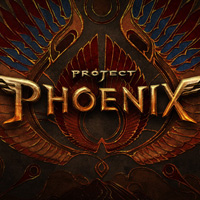
Project Phoenix
Release Date: cancelled
RPG, fantasy, RTS, turn-based, tactics, crowdfunding, indie games, jRPG, singleplayer
Project Phoenix is a hybrid of jRPG and RTS species, created by an independent team of experienced artists from all over the world. In the game we set off on an epic adventure, exploring the world and fighting tactical battles with a team of four daredevils, consisting of an angel, a paladin, an elven tracker and a battle magician.
Project Phoenix is a fantasy-based jRPG game, which also contains numerous elements characteristic of the RTS genre. Behind it is an independent team of Creative Intelligence Arts, composed of experienced developers from all over the world, both from the East and the West.
The action of the game has been set in a universe called Azuregard. This is a classic fantastic world, inhabited by races like people, elves or orcs. The story takes place in turbulent times, when orc invasions are becoming more and more insistent, southern lands are looking for attacks from free people, again gathering forces to try to overthrow the Empire once again, and elves see a prophetic star in the sky, heralding the advent of times when the future of the whole Azuregard will be questioned. In such circumstances, the adventure of the main character of the game, paladin Marcus Stern, comes to begin. Having met an angel suffering from amnesia, he sets off on an expedition designed to give him an answer to the question where his place in the world is, and even to lead to the fate of the universe being in his hands. But the paladin is not alone on this journey - in addition to the angel, he is accompanied by Princess Sylrianah, an elven princess who wants to explore the world beyond her wilderness, and Zarum, a battle magician who is tormented by internal conflicts.
Given the team character of the game, Project Phoenix is sometimes more like an RTS than a jRPG game. When it comes to fighting, we are transferred to a separate arena, which we see from a bird's eye view. Battlefields are relatively extensive (to the extent that there is war fog on them), and the presence of changing terrain or objects that can be destroyed gives an opportunity to use a variety of tactics. In addition to clashes with smaller or larger groups of inferior opponents, the game also offers epic clashes with bosses.
Exploration is no less important than combat. The Azuregard Universe is large in size and offers us a multitude of villages, cities and other places to explore, inhabited by numerous characters who have been endowed with their own stories. There is also no shortage of mysterious races and cultures to get to know. Moreover, the open structure of the world we travel through means that we are not constantly pushed by the plot towards new challenges - we decide for ourselves at what pace we will get to know the rest of the story. As befits an RPG production, each member of our team can be developed in different directions within their class. During our adventures we also acquire equipment, which we distribute among the heroes.
As mentioned, Project Phoenix belongs to the genre of Japanese RPG games, which is also reflected in the graphic style of the title. Three-dimensional binding is full of colors, and the designs of the characters look like taken out of the manga cards. An important element of this production is also the music, for which Nobuo Uematsu is responsible, among others, the composer responsible for the soundtrack of the Final Fantasy series.
Please let us know if you have any comments or suggestions regarding this description.
Last updated on August 14, 2015
Videos and Screens
[4:40] Project Phoenix dev diary
Project Phoenix Summary
Platforms:
PC Windows